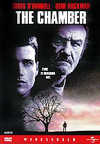The Chamber (1996)
Universal Home Video
Cast: Gene Hackman, Faye Dunaway, Chris O’Donnell
Extras:
Rating:
Sometimes it seems that John Grisham’s novels are turned into movies faster than the best-selling author can write them. This seems even more true in the case of "The Chamber", picked up on the strength of a single-page story layout by Grisham. While a movie associated with Grisham’s name usually warrants a solid, high-quality political thriller, there are certain noticeable formulas in his stories that return over and over again. For the most part, these formulas lend themselves to outstanding performances by some great actors, though sometimes the stories’ implications and presentations might be slightly dubious. "The Chamber" plays deep in America’s South, portrayed as a lively breeding ground for racism, a place where servants are preferably colored and stupid, where criminal rednecks are allowed to walk the streets on their own parole. Adam Hall (Chris O’Donnell) is a young Chicago lawyer with a dark family history rooted in the South. When a bomb killed the children of a Jewish attorney who was actively pursuing black citizens’ civil rights in 1967, a Klan member was charged and sent to Death Row, where he now awaits his execution. Adam takes over the case to handle the final appeal mostly because the convicted murderer is his grandfather, Sam Cayhall (Gene Hackman). Hackman portrays a proud and self-righteous Klan member with a long history of atrocities. Suddenly, Adam discovers much more about his dark and sinister family history than he could have ever imagined. Desperately, he tries to save his grandfather’s life and consistently fails. He slowly recognizes that maybe this vile person doesn’t deserve to be saved. With the help of his Aunt Lee (Faye Dunaway) and his assistant, he begins to realize that his grandfather is a victim of circumstance bred by the Ku Klux Klan and raised in the midst of hate and terrible lynchings.
Superficially, it may seem that "The Chamber" is a movie about racism. It is not. Sadly, these elements are pushed aside, without making strong statements to counter the foul and prejudiced rantings of the Klan members. Just as easily ignored are the political implications of the case and the fact that perhaps Sam wasn’t the murderer after all. Instead the movie presents itself as an exploration of the main characters’ family history and their traditions. It shows how the fanaticism in this family destroyed lives, opportunities, and destinies for generations past and present. Gene Hackman’s portrayal of the hatred-filled redneck with tobacco stains on his teeth and a complete lack of common sense is gripping and mind-boggling. His performance of a human being completely devoid of decency is so strong, it almost chokes you while watching the film. It is a role that gives Hackman the opportunity to take his wealth of acting experience and turn it into a strikingly real, memorable character. Faye Dunaway has a strong performance as well, portraying Sam’s broken, alcoholic daughter, desperately trying to keep the blankets over the family’s past.
As you might expect, this movie does not live on action or a fast pace but on the slowly ticking clock that slowly seals Sam’s fate. The true spark of this film lies within the gripping conflict between the two main characters, Sam and Adam. Counting down his days, Sam ponders his convictions and feelings, while Adam has to face and accept the full truth of his family background.
Sadly, the movie never really takes a clear position on the death penalty, either for or against. Gene Hackman has a great and disturbing scene, describing the inhuman effects of the poison gas on the nervous system and the painful seizures it causes, but the overall tone of the movie suggests that characters like Sam indeed deserve to die. This lack of determination, however, is a general problem in Grisham’s writings and not so much in the movie’s interpretation of the material. "The Chamber" is presented in its original 2.35:1 <$PS,widescreen> theatrical aspect ratio and has experienced a very clean, new <$16x9,anamorphic> transfer of the film that is of excellent quality. The image is very sharp with lots of detail, especially in its <$16x9,anamorphic> display mode. There is no noise or color-smearing anywhere. Edges are solid and the colors are natural, as in many others of Universal’s DVD transfers. The color saturation is well-balanced, with good highlights and dark, solid blacks, while maintaining plenty of detail even in the darkest shadows and nighttime scenes.
Of similar high quality is the disc’s <$5.1,5.1 channel> <$DD,Dolby Digital> audio transfer. The movie features an impressively minimalist, focused music score that enhances the movie’s impact substantially. I was very impressed with the placement and delicate quality of many of the music’s pieces, even though it gives away hints of coming actions once in a while. It frugally and precisely accentuates certain emotions and actions. It clearly and successfully exemplifies the notion that sometimes, less is more and that skillfully placed periods of silence can create just as many emotions as fully scored themes. They stress the bleakness of the characters’ perspectives.
"The Chamber" comes in English, with optional French and Spanish dubs, selectable from the disc’s menu. The movie is also <$CC,closed captioned> in English and additionally contains Spanish subtitles.
"The Chamber" is a typical John Grisham thriller with all its strengths and weaknesses. This time, however, I somehow perceived the story as "more personal" than ever, speaking from a combination of the theme and the theme’s undertones. The movie’s superb visual storytelling features some remarkable images and cut sequences. Universal have established themselves as one of the leading DVD publishers with the exceptional number and quality of their releases, and once again, "The Chamber" is good example as to how good a movie can look on DVD.







